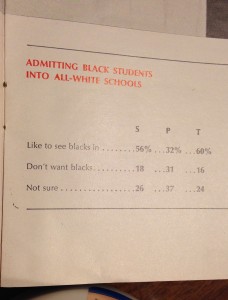My “Life” magazine from the preceding post was issued on May 16, 1969. Here is another snapshot of history. S stands for students, P for parents, T for teachers, and A for administration in the “Life” polls. 
In this time of racial unrest, I find this poll instructive. In 1969, we were a full 14 years past the Supreme Court decision Brown versus the Board of Education of Topeka, Kansas, which integrated America’s schools. Yet the “Life” poll asked these questions, questions that have an inherently offensive undertone in my view. I found the answers thought-provoking.
Fourteen years after Brown versus the Board of Education, we still had all white high schools to integrate. We still do. In the poll, teacher and student percentages ran close to each other. Teachers and students were much more open to change than parents, with the majority favoring integration, although certainly not an overwhelming majority. Parents favored hanging onto the status quo or were uncertain whether to accept integration or not.
I believe there is a tendency on the part of many in society today to look at the situation of African-Americans and point to progress that has been made as proof that protesters are behaving irrationally. I look at this poll and I understand at least one reason why Non-African-Americans should not be too quick to judge. We can pass laws to mandate equality. We can strike down laws that prevent equality. But laws and court decisions do not immediately – or sometimes ever – change people’s perceptions. A law is only as good as the people standing behind that law and supporting the law.
The fact that I am free to become an astronaut does not change the fact that my neighborhood may be as dangerous as a war zone. The fact that I am free to become a university professor does not mean that my darker complexion will not result in a store cop following me from floor to floor in a Chicago department store.
Old though it is, this poll reminds us that the world we legislate is not necessarily the world in which we live.
